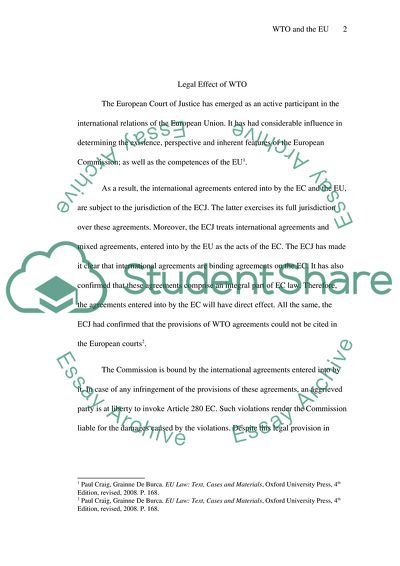Cite this document
(Legal Effect of World Trade Organization Essay Example | Topics and Well Written Essays - 4000 words, n.d.)
Legal Effect of World Trade Organization Essay Example | Topics and Well Written Essays - 4000 words. Retrieved from https://studentshare.org/law/1719706-outline-and-assess-the-extent-to-which-the-wto-agreement-have-legal-effect-before-eu-and-member-states-courts-creating-rights-for-individuals-and-the-possibility-of-testing-the-compatibilily-of-eu-secondary-legislation-with-these-agreements
Legal Effect of World Trade Organization Essay Example | Topics and Well Written Essays - 4000 words. Retrieved from https://studentshare.org/law/1719706-outline-and-assess-the-extent-to-which-the-wto-agreement-have-legal-effect-before-eu-and-member-states-courts-creating-rights-for-individuals-and-the-possibility-of-testing-the-compatibilily-of-eu-secondary-legislation-with-these-agreements
(Legal Effect of World Trade Organization Essay Example | Topics and Well Written Essays - 4000 Words)
Legal Effect of World Trade Organization Essay Example | Topics and Well Written Essays - 4000 Words. https://studentshare.org/law/1719706-outline-and-assess-the-extent-to-which-the-wto-agreement-have-legal-effect-before-eu-and-member-states-courts-creating-rights-for-individuals-and-the-possibility-of-testing-the-compatibilily-of-eu-secondary-legislation-with-these-agreements.
Legal Effect of World Trade Organization Essay Example | Topics and Well Written Essays - 4000 Words. https://studentshare.org/law/1719706-outline-and-assess-the-extent-to-which-the-wto-agreement-have-legal-effect-before-eu-and-member-states-courts-creating-rights-for-individuals-and-the-possibility-of-testing-the-compatibilily-of-eu-secondary-legislation-with-these-agreements.
“Legal Effect of World Trade Organization Essay Example | Topics and Well Written Essays - 4000 Words”, n.d. https://studentshare.org/law/1719706-outline-and-assess-the-extent-to-which-the-wto-agreement-have-legal-effect-before-eu-and-member-states-courts-creating-rights-for-individuals-and-the-possibility-of-testing-the-compatibilily-of-eu-secondary-legislation-with-these-agreements.


